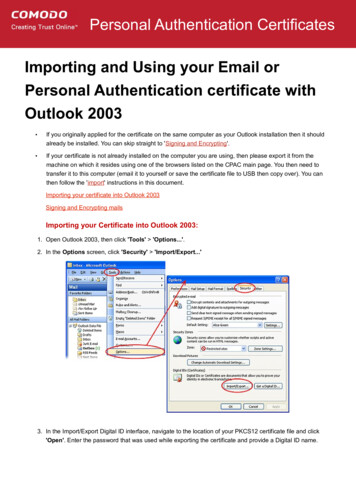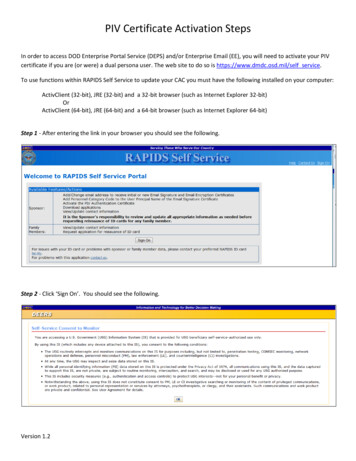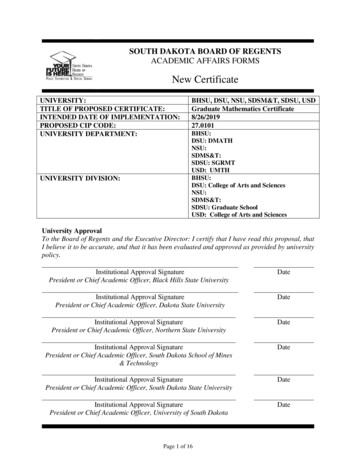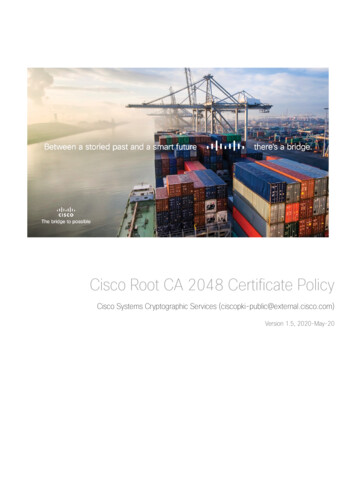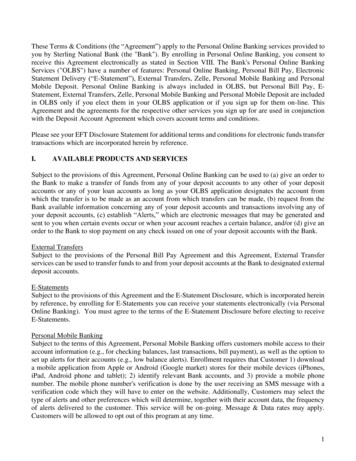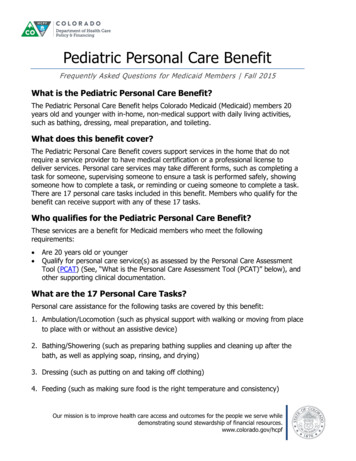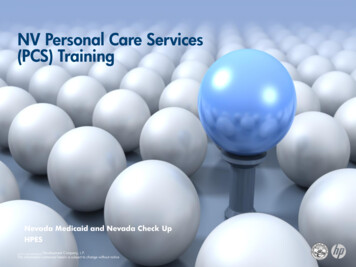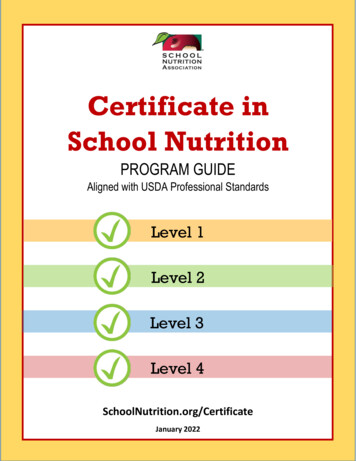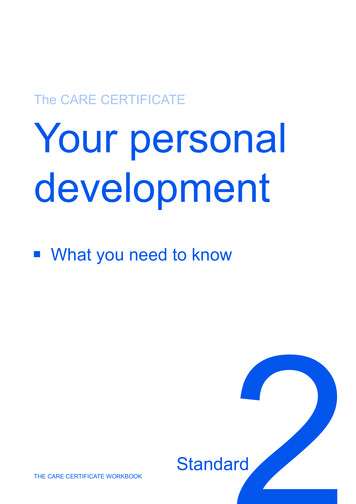
Transcription
The CARE CERTIFICATEYour personaldevelopmentWhat you need to knowTHE CARE CERTIFICATE WORKBOOKStandard
Developinga personaldevelopmentplan (PDP)Personal developmenthappens throughout yourlife. At work, it starts withagreeing your aims andobjectives and thinking about yourstrengths and development needs.You then set goals so that you canmeet your objectives and make themost of your talent.A personal development plan (PDP) is an action plan that helps you get organised,identifies learning and development needs to help you do your job better or help in yourcareer, and then tracks progress.For those new to health and social care, the Care Certificate is the beginning of yourlearning and will usually form part of your induction. All good employers will want todevelop their workers further over time. A development plan to achieve this might beagreed during your induction period or during a review at a later point.As a first step, you will agree with your employer how you are going to complete the CareCertificate, including how long it (and any other induction training) will take. Then, as youcontinue to work in health and social care, it will be important that you develop your skillsand abilities. This may involve further training, specialist courses and qualifications. Youremployer will know what they expect from you and will help you set targets and find thelearning you need, and so will create your PDP with you. The majority of PDPs cover a12-month period, and should therefore be updated and renewed each year.The most important person involved in your PDP is you; however, your manager, otherworkers and the people you provide care and support for will all play a part.In order to agree your PDP you need to ask yourself questions such as:What do I want to achieve?What are the standards, skills and knowledge needed by my current role and do Ihave any gaps?What are the learning and development opportunities in my current role?What are my ambitions and goals?Am I making the right choices to get me there?THE CARE CERTIFICATE WORKBOOK STANDARD 22
Supervision and appraisalWhen you are carrying out your work activities, you will be supervised by a more seniormember of staff. ‘Supervision’ has two meanings in social care and health work:‘working under supervision’ means that you are working within the sight of a moreexperienced worker, not necessarily your manager, who is overseeing your work‘supervision sessions’ are pre-arranged meetings between you and your manager orsupervisor in order to discuss your performance and development.Supervision sessions are a regular opportunity to talk through any part of your work, yourrole or about the individuals you provide care and support for. Your supervision might takeplace one-to-one with your manager or in a group or team meeting. Sessions take place ata time and frequency agreed with your manager and notes should be kept.Regular supervisions are important to any job so concerns can be addressed, progresschecked and additional support arranged. Whether your work is in one location orwithin the community, your employer should ensure that you have regular supervisionopportunities.An appraisal is a one-to-one meeting, usually once a year, between you and yourmanager which reviews how well you are working and making progress. At this meetingyour manager will support you to plan your next steps and update your PDP.Agreeing your objectivesYour objectives are the things that you want to achieve. Objectives are easiest to agree ifyou keep them ‘SMART’, which stands for specific, measurable, achievable, relevant andtime-based.Once you have set clear SMART objectives, it is time to break them down into manageableaction points and record this information in your basedYou should follow these steps:Step 1. Agree objectivesExample: Be able to write and review care plans withthe individuals who receive care and support in myworkplace.Step 2. Plan activities and timescales to meet the objectivesExample:read the instructions and look at the process for care planning in my workplace.discuss these and ask questions of an identified more experienced worker.work with my manager to choose three people with care plans and get theirpermission to discuss those care plans with them.arrange with my manager how and when I am going to report back and discuss anyquestions or learning points.THE CARE CERTIFICATE WORKBOOK STANDARD 23
Plan the timescale: for example, one of the four activities listed will be achieved eachweek, so this will take four weeks (say which four weeks this will be).Step 3. I do the agreed activities within the planned timescale.Step 4. Outcome.Discuss with my manager the three care plans examined and the comments of the peoplewho are supported by them. Possibly update those plans (with my manager), and reviewwhat I have learned from the process.Developing your knowledge, skills and understandingCore skillsWhatever your health or social care workplace, it is important that you have the right levelof literacy, numeracy and communication skills.You may need to read and contribute to care plans, record data clearly and legibly,fill out forms, write emails or take notes.You need to be able to read and understand instructions about your ways of working.You might be involved in supporting an individual to monitor their weight, forexample, and keep a record of weight loss and then calculate overall progress.You might take and record an individual’s temperature or blood pressure at regularintervals and report on any concerns.You might need to know the difference between a variety of different measures, suchas gram and milligram, and be able to calculate simple conversions.Good communication skills are one of the Care Certificate Standards. When working inhealth or social care an exchange of information will develop your understanding of anindividual’s needs. If the information is inaccurate or misleading, mistakes can be madewhich can result in care that is not person-centred.The internet has a number of websites where you can check your literacy, numeracyand communication skills and get help to develop them further if needed. Non-webbased materials and face-to-face learning opportunities can also be found. You mightbe expected to have skills at a specific level in your role and be provided with support toimprove your skills. Ask your manager if there are any particular opportunities, resourcesor support available.Learning and developmentYour employer may provide internal training that is designed to help you with your learningand development. You should ask your manager or colleagues about this. Findinginformation outside your organisation can also help you gain knowledge and skills.THE CARE CERTIFICATE WORKBOOK STANDARD 24
The Care Quality Commission (CQC), your trades union or staff association (if you haveone), the Social Care Institute for Excellence, or other workers and networks provide awealth of guidance and information. Sector bodies Skills for Care or Skills for Health,or the National Skills Academy for Health, are all good sources of information aboutqualifications, courses and apprenticeships that are suitable for your eryone learns in different ways and there are lots of opportunities today to mix andmatch (to ‘blend’) different methods and opportunities to suit you and how you like to learn.Depending on your role, there are many formal and informal activities that you can carryout as part of a blended approach to learning. Resources for learning may be readingmaterials, TV or video clips, or research on the internet or even applications (apps) onyour phone. These all develop your knowledge and understanding. Learning also takesplace through social media forums such as Twitter and other social media. These are liveand can develop your awareness of others’ approaches, but always check with the ways ofworking in your workplace if you are unsure about anything you have learned - and neverbreak the confidentiality of anyone at your workplace.Structured learning will include work shadowing, where you work alongside a moreexperienced worker, or undertaking e-learning (that is, computer-based learning). Formallearning, courses and qualifications, can improve your knowledge and skills and confirmyour competence to do your job.Active learning involves you in reading, writing, describing, discussing, listening andreflecting on presented information. It gives you the opportunity to explore new areas andgives you fresh ideas. Discussing ideas with others will give you greater self-confidencein your work as you gain deeper knowledge and understanding. This will enable you to putthe theory into practice and improve your overall work.Reflection is a learning tool which uses past experiences to help you develop your skillsand gain greater understanding of your abilities. It involves thinking about your actionsand how you relate to the people who receive care and support as well as your workcolleagues. You look back on a situation or activity and consider the way it has been done,thinking about what you could do differently. It helps you think about how good your work isand the improvements that you want to make.Speak to you manager and other colleagues about their recommendations for furtherlearning.Receiving feedbackYou need helpful feedback when joining a new workplace and learning new skills. Asyou progress through the Care Certificate and your induction, you should receive regularfeedback from your manager or assessor. This should help you to develop your skills,provide clarity and give you the ability to meet the standards required.THE CARE CERTIFICATE WORKBOOK STANDARD 25
Not receiving any feedback can lead to a false assessment of your own abilities. Healthand social care work involves using knowledge, skills and understanding togetherto manage complicated and stressful situations in a caring and compassionate way.Constructive feedback is one way of helping you develop your confidence and your abilityto solve problems. It is an essential part of learning and development which helps youdevelop awareness of your strengths as well as areas for improvement.Feedback can be formal or informal:FormalInformalFormal feedback would usually begiven in writing. This might be partof an assessment or appraisalor on a comments sheet. Formalfeedback is also given verbally insupervision sessions, but is thenwritten down in the notes of thesession.Informal feedback happens inday-to-day discussion with workcolleagues, managers or theindividuals that you provide care andsupport for.You should be given feedback as soon after the event as possible. The most helpfulfeedback is always given positively and is constructive. This means it should be basedon the facts and describe what you could do differently or what you did well. It shouldconcentrate on how to change rather than on personal factors like confidence orintelligence.The Care CertificateThe Care Certificate is a key part of the induction an employer has to provide. It isexpected that it be completed and assessed before new health or social care workersare allowed to work without direct supervision. It sets out specific values, abilities andbehaviour that ensure that the new health or social care worker is able to provide goodquality care with compassion. It comprises 15 different standards, ranging from yourown role and development to values like equality, diversity and dignity, to health andsafety and infection prevention. You need to be overseen for each of the standards untilyour assessor is confident that you are meeting them all and can work without directsupervision. The 15 standards can be found Care-Certificate/Care-Certificate.aspxTHE CARE CERTIFICATE WORKBOOK STANDARD 26
The Care Certificate workbooks and activities cover the knowledge content, though youremployer may choose to provide more detailed information about each part. Whether youare using these training materials, or others your employer has arranged, it is importantthat you are given the time to learn during your induction. Your employer will want toregularly check progress, review your learning and feedback.The combination of the knowledge content, practical training and workplace assessmentshould enable you to develop the essential skills to undertake your role. Some workersundertaking the Care Certificate will require more support than others. Your managershould be able to identify this as part of supervision, but always let them know if you needmore support.Continuing your learningAs a health or social care worker, it is important to carry out further training andqualifications. Continuing professional development, (CPD), is a record of your learning,development and achievement. It will usually be in a folder which keeps records of yourprogress beyond your initial training. The PDP will help you to focus on areas for learningand development. Continual learning is needed by all workers, especially in health andsocial care as changes happen regularly. For example, legislation may change, ways ofworking may be developed and ways to complete documentation may be improved. YourCPD file will become valuable evidence of what you have done to develop your knowledgeand skills.THE CARE CERTIFICATE WORKBOOK STANDARD 27
The CARE CERTIFICATEYour personaldevelopmentWhat do you know now?THE CARE CERTIFICATE WORKBOOKStandard
Activity 2.1aThere are a range of differentsources of support availableto you that will help you toprogress your learning anddevelopment in your role.Complete the diagram belowto identify some of thesources of support that youcould use or access.Your personalDevelopmentIdentify - point out, highlight or notedown the main answers or examplesthat relate to the subject.Sources ofsupport for mylearning anddevelopmentinclude.THE CARE CERTIFICATE WORKBOOK STANDARD 29
Activity 2.1bCreating a personal developmentplan (PDP) is a step-by-stepprocess and will involve youworking with different people. Fillin the boxes below to describe theprocess for agreeing a personaldevelopment plan and for eachstep identify who will be involvedin the process.Describe - to describe means to create apicture with words but not simply writing alist of bullet points.Identify - point out, highlight or notedown the main answers or examplesthat relate to the subject.Step 1:Step 2:Step 3:The following peoplewill be involved.The following peoplewill be involved.The following peoplewill be involved.THE CARE CERTIFICATE WORKBOOK STANDARD 210
Activity 2.1cLearning is a process thatinvolves us throughout our livesand not just at school. There aremany different ways in whichwe can learn, for example usingfeedback from others is a greatway to learn and help us todevelop and improve the way wework.Explain - to explain something youwill need to provide a clear accountof your understanding includingdetails like why and how.Complete the sentence below toexplain why feedback from others isso important for our learning process.Feedback from others is important in helping me todevelop/improve because.THE CARE CERTIFICATE WORKBOOK STANDARD 211Try and use as manyof the following wordsas possible in yourexplanation: Constructive Competence Confidence Knowledge Improvement Learning from others
Activity 2.2aLiteracy, numeracy and communication skills arenecessary for you to carry out the requirementsof your role. Often the skills that you need to usewill be very specific to your responsibilities andthe service that you work in. Fill in the boxesbelow to describe how you will use your literacy,numeracy and communication skills in practice.I will need to use my literacy skills when I.I will need to use my numeracy skills when I.I will need to use my communication skills when I.THE CARE CERTIFICATE WORKBOOK STANDARD 212Describe - to describemeans to create apicture with words butnot simply writing a listof bullet points.
Activity 2.2bYour current levels ofcompetence in literacy, numeracyand communication are likelyto be very specific to you asan individual. Explain howyou would check your currentlevels of literacy, numeracy andcommunication skills.Explain - to explain something youwill need to provide a clear accountof your understanding includingdetails like why and how.THE CARE CERTIFICATE WORKBOOK STANDARD 213
Activity 2.2c,2.2d and 2.2eComplete the table below todescribe how the differentdevelopment activitieshave helped to improveyour knowledge, skills andunderstanding.DevelopmentactivityProvide adescription ofthe developmentactivityDescribe - Toto describedescribe meansmeans toto createcreate aa simplywritingwritinga list of bullet points.How has ithelped toimprove yourknowledge?1. A learningactivity thatyou haveundertakenrecently2. Reflectingon a situation3. Feedbackfrom othersTHE CARE CERTIFICATE WORKBOOK STANDARD 214How has ithelped toimprove yourskills?How has it helpedto improve yourunderstanding?
Activity 2.2gPart i)For each of the learningopportunities below,decide whether each is anexample of a formal learningopportunity or an informalone. (Tick your option).Formal or informallearning opportunity?Annual Appraisal with your managerFORMALINFORMALE-learning coursesFORMALINFORMALWatching a documentaryFORMALINFORMALUndertaking a training courseFORMALINFORMALBreaktime discussion with colleaguesFORMALINFORMALReading a magazine or journalFORMALINFORMALTHE CARE CERTIFICATE WORKBOOK STANDARD 215
Activity 2.2gPart ii)Select 3 learning opportunities thatare available to you, you could selectones from the list above or ones thatare specific to you. For each learningopportunity, list how it will help you toimprove the way you work.Learning opportunityList- this term means to identifythe main points which can bewritten as bullet points.How will it help you improve the way you work?1.2.3.THE CARE CERTIFICATE WORKBOOK STANDARD 216
Activity 2.2iContinuing professionaldevelopment (CPD) isessential for work in thehealth and social caresectors. Explain why CPDis important for your ownand others’ development.Explain - to explain something youwill need to provide a clear accountof your understanding includingdetails like why and how.THE CARE CERTIFICATE WORKBOOK STANDARD 217
Developing your knowledge, skills and understanding Core skills Whatever your health or social care workplace, it is important that you have the right level of literacy, numeracy and communication skills. You may need to read and contribute to care plans, record data clearly and legibly, fill out forms, write emails or take notes.



